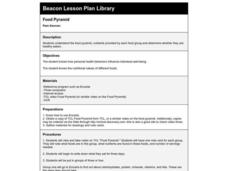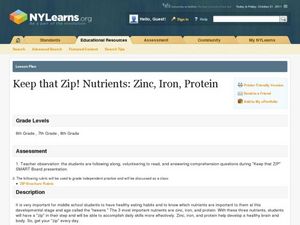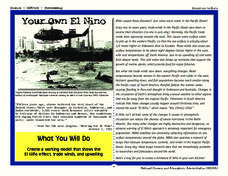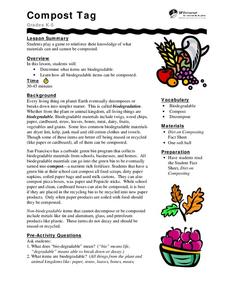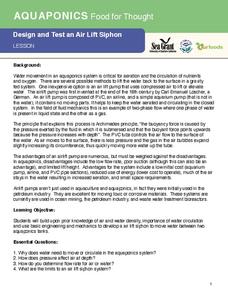Curated OER
You Are What You Eat
Students study the essential nutrients for our bodies. In this healthy choices lesson students complete several activities which includes research and a presentation.
Curated OER
Behavior Assessment & Nutrient Needs
Students identify the factors that influence eating behaviors. They discover the nutrients that are needed in a teenager's body. They also identify the major food groups and examine the food pyramid.
Curated OER
Knowing your nutrients
Middle schoolers comprehend the basics of the nutrition label. They comprehend the Recommended Daily Allowances. Students analyze the regulations that govern food labeling. They review the Food Pyramid.
Curated OER
Food Pyramid
Second graders explain the food pyramid, nutrients provided by each food group,and determine whether they are healthy eaters. They note what foods are in this group, what nutrients are found in these foods, and number of servings needed.
Curated OER
Keep that Zip! Nutrients: Zinc, Iron, Protein
Learners explain the importance of zinc, iron and protein. In this biology lesson, students create a brochure containing information about the three nutrients. They share their brochure in class.
Curated OER
Where Do I Fit In The Food Pyramid?
Students discuss how their daily diets fit into the dietary guidelines set out by the food pyramid. They write a paragraph describing good health habits and identify areas where their personal diet can be improved.
Curated OER
Food: Habits and Holidays
In this foods of the world instructional activity, students answer true and false questions about their own eating habits, than complete a matching activity where they match foods with countries of the world.
Curated OER
Explore the Food Web
Students identify plants and animals in the journals of Lewis and Clark's expedition. They describe the various animal habits. Students interpret the behaviors of the animals discovered on the expedition. They design a food web using...
Curated OER
Life In Extreme Environments
Pupils work together to design and participate in experiments to determine the rate rotifers eat. After completing their experiments, they record and analyze their data and identify any challenges faced during the procedure. They...
Curated OER
Food For Thought
Students create an individual menu for one of their peers. They must examine their peer's activity level and family history.
May Media Group
Treatment Plants
Young scientists explore nature's water treatment plants in this simple science demonstration. By placing a stalk of celery in a cup of water mixed with food coloring, children are able to observe how plants absorb nutrients and...
National Park Service
The Secret of Life
Dead trees provide nutrients for the soil, food for animals, protection and a home for organisms, a seed-bed for new trees, and a place for nitrogen-fixing bacteria to live. In the activity, pupils collect decaying logs, expose them to a...
National Park Service
Reduce Our Carbon Footprint, Let’s Compost!
Roll up your sleeves and get a little dirty with this elementary and middle school compost lesson plan. All you need is a large plastic container, a couple old newspapers, some organic waste, and a few hundred worms and you're ready...
Nemours KidsHealth
School Lunch: Grades 9-12
Go! Slow! Whoa! As part of a study of the nutritional value of foods available on the school campus, groups label those that are fine anytime as "Go" foods. Those that are okay a few times a week get the "Slow" label while those...
Curated OER
Human Body Series - The Digestive System Quiz (Grades 6 to 8)
Get those gastric juices going with a delicious quiz on the digestive system! Middle school learners fill in the blanks about the process of digestion, the function of different organs and fluids, and problems that can occur with the...
Curated OER
Wetland Metaphors
Learners describe the characteristics of wetlands and identify their ecological functions. They inspect items and use them to create metaphors about wetlands.
K12 Reader
Ecosystems
Examine how living and non-living things work together in a reading passage about ecosystems. Class members read the text and then respond to five response questions that relate specifically to the content of the passage.
NOAA
Ocean Zones
How can organisms light up in water? Bioluminescence is light produced in a chemical reaction that can occur in an organism's body. First, learners determine what happens to light/color as you move into the deep ocean. In groups, they...
NOAA
Your Own El Nino
Scholars make a model to discover how the force of trade winds over the Pacific Ocean creates an El Niño. Super scientists observe how the severe weather affects life in water and on land.
SF Environment
Pre-School Composting and Recycling!
You can never be too young to get involved in composting or recycling. Here is a lesson plan that has been made for the very littlest learners and it's all about the importance of conservation. They'll sort compostable and recyclable...
SF Environment
Compost Tag
Composting is a great way to get children involved in recycling. First, they discuss how biodegradable products decompose to make compost. Then, they talk about what can and cannot be composted. They play a game similar to around the...
University of Southern California
Design and Test an Air Lift Siphon
Build an air lift siphon using your mad physics skills! Learners first investigate the importance of circulating water in aquaponics systems. They then use density to their advantage as they engineer an air lift siphon
United Nations
Compost Monitor Training
What should go in the trash, and what can be composted? Guide your young conservationists through the process of composing their trash with a instructional activity about the different ways we can dispose of garbage. Using a trash bag...
Curated OER
Where's the Beef - Beef Facts or Hype, Is it Bad for You?
Analyze a Happy Meal™ for nutrient content and calories. Blend the contents into "McMush" and use Biuret's solution to test for protein content. There are a few problems with the lesson plan: the resource links are no longer...



